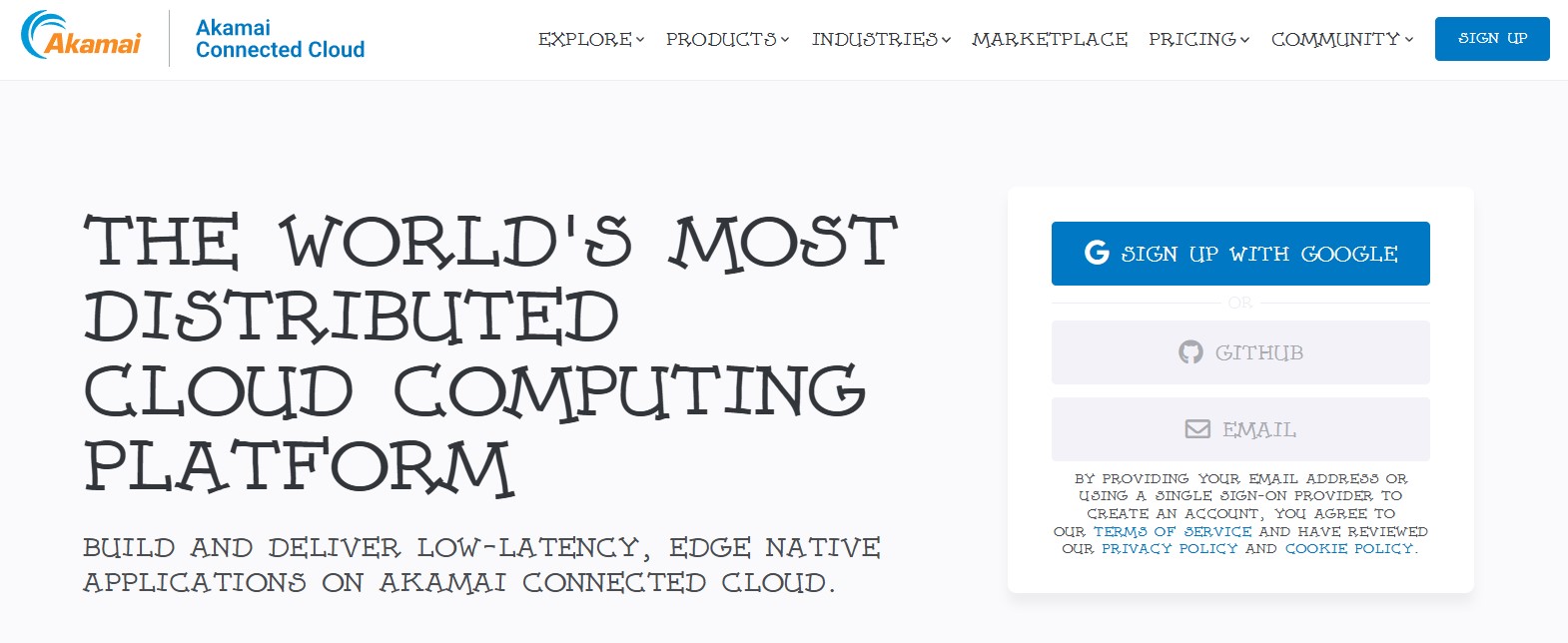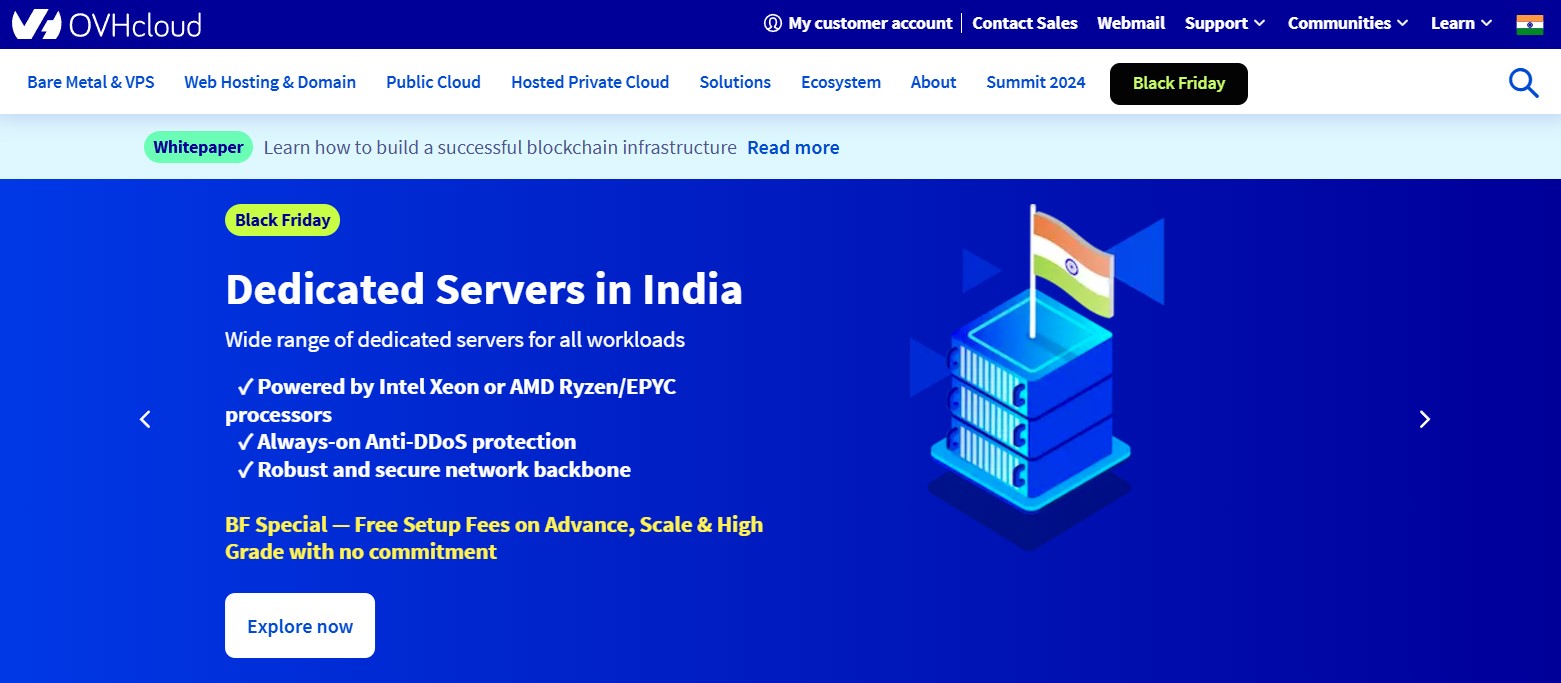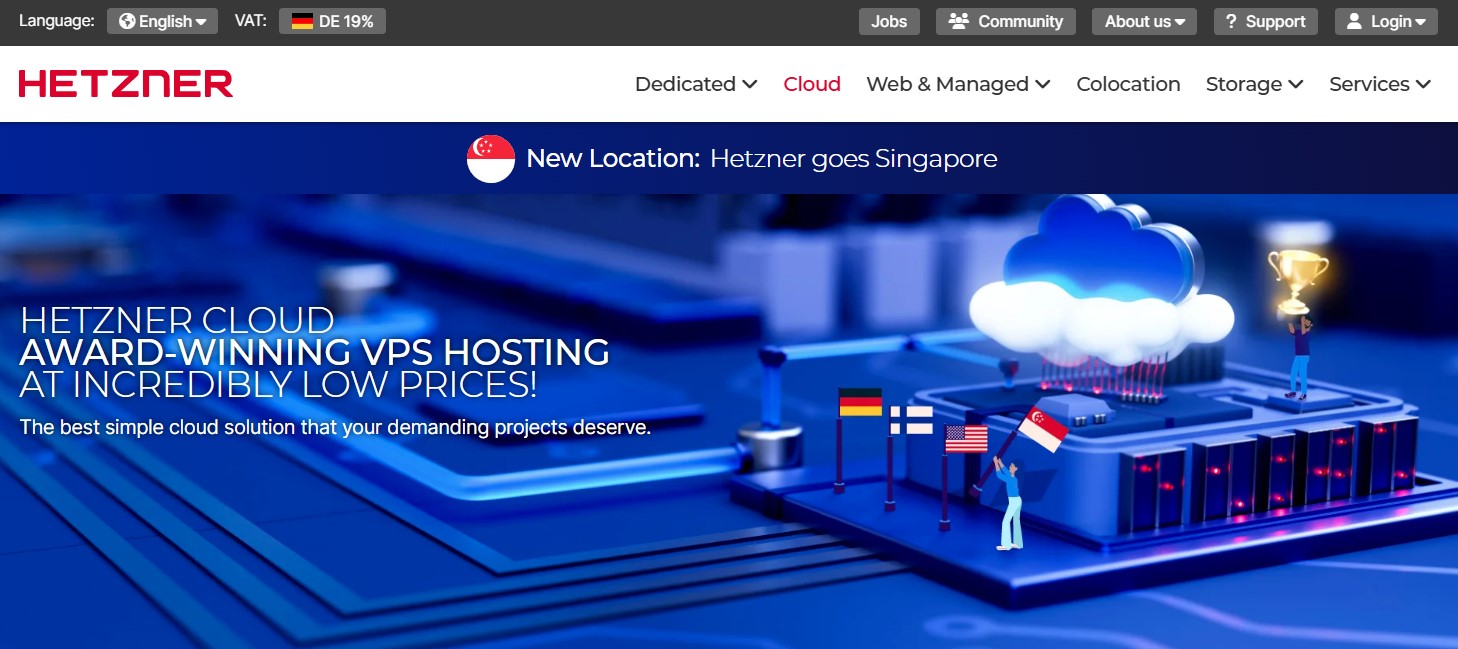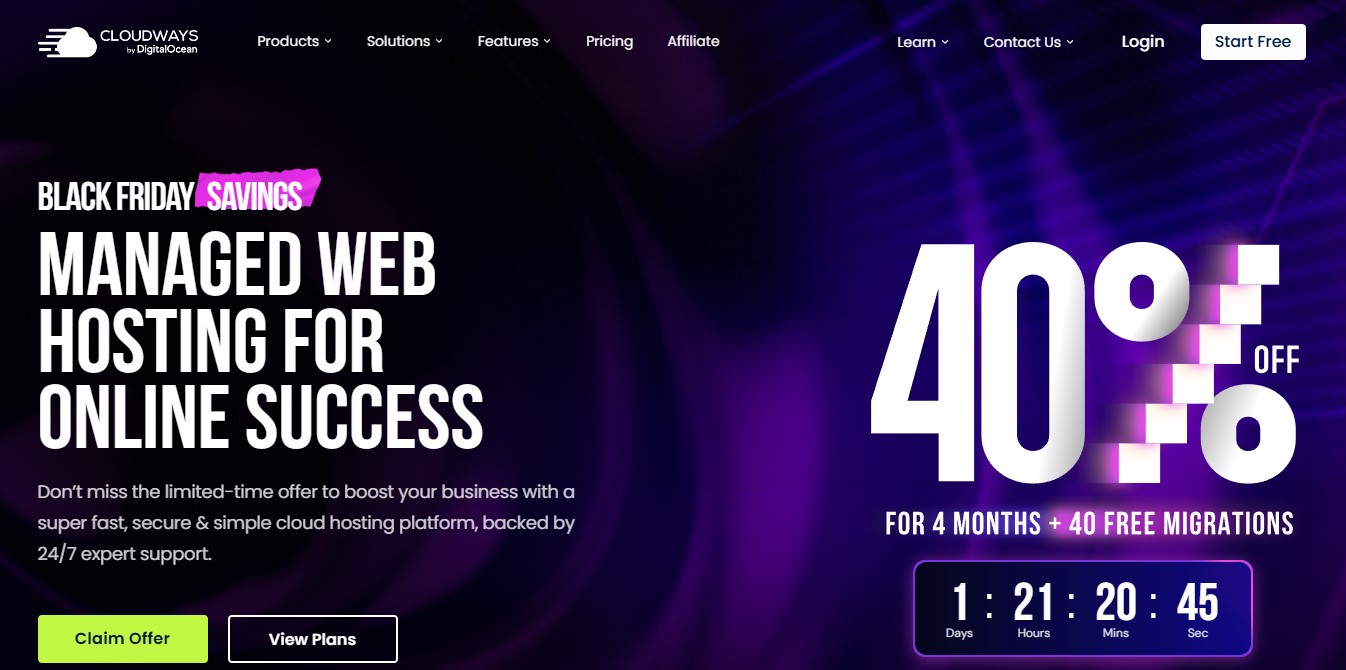Top 10 Kamatera Alternatives for Cloud Hosting & VPS in 2025

Kamatera is a popular cloud and VPS service provider known for its cloud infrastructure services, such as cloud hosting, servers, reseller hosting, and managed cloud services. It's used for web hosting, app & web development, database management, and more. The platform’s affordable pricing plans for VPS, cloud hosting, shared hosting, and dedicated servers make it a go-to option for many mid-to-large-scale businesses. Before finding the best Kamatera alternatives for you, we first put this platform to the test to determine the grounds for comparison.
While researching and exploring the platform, we were quite impressed with its 4.8/5 star ratings on HostAdvice. And that wasn’t just based on one or two reviews but over 150. Its users seem to be highly satisfied with its services and ease of use. However, these ratings dropped to 3.5/5 on Trustpilot, probably giving us a solid reason why businesses are looking for Kamatera alternatives in 2025.
Although Kamatera’s services and pricing models are exceptional, the platform still lacks customized customer plans. Every business has distinct needs and requirements related to managed services or hosting solutions. In such a case, you might have to look for a better alternative to Kamatera that is more customizable and flexible.
So, to help you find the best VPS and cloud service provider, we have listed the top 10 Kamatera alternatives below.
Global Market Overview of Cloud Hosting and Related Services
- The market size for global cloud services was valued at $454.20 million in 2022 and is expected to reach $2192.54 billion by 2032 at a CAGR of 17.10%. (Source: Precedence Research)
- New research has indicated that people use up to 36 cloud-based apps and services daily. (Source: Hosting Advice)
- AWS holds the prominent share in cloud hosting providers with 33%, followed by Microsoft Azure with 23% and Google Cloud with 11%. (Source: Wire19)
- Less than 50% of traditional small-scale businesses use cloud infrastructure or hosting services. (Source: TechRepublic)
- The average cost of basic cloud hosting services is around $8.47 monthly. (Source: Bluehost)
5 Reasons Why You Should Switch to Kamatera Alternative
While Kamatera suits your cloud hosting and VPS needs the best, there is nothing wrong with exploring better options. Here are some reasons why you should switch to better Kamatera alternatives right away.
Complex Pricing Structure
Kamatera's pricing structure seems complex, especially for newbies. As a startup, you should manage all your expenses to ensure they don’t exceed your budget. While Kamatera's costs are based on pay-as-you-go services, it might turn out to be a challenging situation to calculate the monthly expenses accurately.
Limited Entry-Level Plans
As Kamatera is more focused on offering high-performing cloud infrastructure, it doesn’t offer low-cost hosting plans. This makes it less ideal for small businesses with minimal hosting needs.
Steep Learning Curve
Kamatera’s advanced functionalities may result in a steep learning curve for users new to web hosting. Businesses with a lack of technical expertise may struggle to use the platform’s capabilities to the fullest.
Lack of Managed Services
Kamatera’s primary focus is on offering unmanaged hosting solutions, which might offer more control to tech-savvy users. However, it can be a drawback for those with a lack of experience with managed services.
Extra Costs for Add-Ons
Although Kamatera’s plans offer a range of features and functionalities, some essential add-ons, such as load balancers, managed backups, and monitoring services, may demand extra cost. This might increase your overall expenses on cloud services.
Top 10 Best Kamatera Alternatives in 2025
So, that's the most awaited part! We have curated a list of the best alternatives to Kamatera that offer more customized and affordable cloud hosting and VPS solutions:
#1. Vultr
Vultr is a complete cloud hosting and VPS solution, making it one of the viable Kamatera alternatives for businesses with limited technical expertise and budget for such services.

- Pricing: The plans for Vultr start from $2.50 a month, making it one of the cheapest cloud service providers. This can be especially beneficial for small-to-mid businesses with little requirement for web hosting services.
- Features: Vultr offers bare metal servers in addition to its standard computing instances for block data storage for scalable data storage, dedicated GPU instances for AI and ML and improved performance.
- Use cases: Vultr isn’t just best suited for start-ups but for developers and large-scale businesses that requires high performance under budget. For instance, a newly set-up business could benefit from Vultr’s affordable pricing and also scale as traffic grows.
Comparison with Kamatera:
- Pricing: Vultr’s pricing plans are more comprehensive with granular billing, making it slightly cheaper than Kamatera.
- Performance: Although both Kamatera and Vultr offer solid performance, the latter has a slight edge due to its 100% SSD-backed instances.
- Data Centers: Vultr has comparatively more data centers globally than Kamatera, giving it the upper hand in reduced latency in some regions.
#2. Linode
Linode has recently joined Akamai's global network, combining its developer-centric cloud infrastructure with Akamai's enhanced performance and reach.

- Services: Linode offers a range of cloud services, including virtual machines, Kubernetes for container management, and managed databases. These services cater to various use cases.
- Pricing: Linode's pricing is competitive, with basic instances starting at $5 per month. This is similar to Kamatera's pricing but includes the added benefit of Akamai's global content delivery capabilities.
- Developer Focus: Linode remains dedicated to developers by providing extensive documentation, a powerful API, and community support. This makes it an excellent choice for developers who value freedom and control.
Comparison with Kamatera:
- Customer Support: Linode is known for its excellent customer support, offering more hands-on assistance than Kamatera.
- Ease of Use: Kamatera's user interface is more beginner-friendly, while Linode offers more advanced options, making it better suited for developers with specific needs.
- Network Performance: Linode's network performance is highly regarded, but Kamatera may provide better reliability in certain regions due to its extensive infrastructure.
#3. AWS (Amazon Web Services)
AWS stands as the top provider in the cloud services industry, offering the most comprehensive and scalable solutions for projects of any size and type.

- Scalability: AWS's scalability is unmatched. It effortlessly supports everything from small websites to large enterprise applications. For instance, Netflix uses AWS to serve millions of users simultaneously across the globe.
- Pricing: Although AWS's pricing can be complex, it offers cost-saving options through reserved instances, spot instances, and various pricing plans. To avoid unexpected charges, it's important to manage and monitor usage carefully.
- Learning Curve: AWS offers advanced functionality and integrations, but it has a steeper learning curve compared to simpler platforms like Kamatera. This complexity can be beneficial for companies needing powerful, enterprise-level solutions.
Comparison with Kamatera:
- Scalability: AWS provides unparalleled scalability with a wide range of services, far surpassing Kamatera's offerings. However, this comes with added complexity and cost.
- Pricing: Kamatera is more straightforward and affordable for small to mid-sized projects, while AWS can become costly due to its extensive features.
- Ecosystem: AWS has a more extensive ecosystem with numerous integrations, which might be excessive for smaller projects that Kamatera can handle more efficiently.
#4. Google Cloud Platform
Google Cloud is renowned for its advanced capabilities, particularly in big data, machine learning, and AI, making it an ideal choice for data-centric applications.

- Integration: A key advantage of Google Cloud is its seamless integration with the Google ecosystem, including services like Google Workspace, BigQuery for data analytics, and TensorFlow for machine learning. This is especially beneficial for companies already using other Google services.
- Pricing: Google Cloud offers a generous free tier, making it suitable for startups and small projects. Additionally, its competitive pricing for compute instances allows organizations to scale efficiently.
- Ease of Use: Google Cloud is generally easier to use than AWS, featuring a more intuitive user interface and extensive documentation. However, it still offers more advanced features than Kamatera, which may present a learning curve for beginners.

Comparison with Kamatera:
- Machine Learning Integration: Google Cloud excels in AI and machine learning tools, far surpassing Kamatera, making it the preferred choice for data-driven applications.
- Free Tier: Google Cloud's free tier is more generous and includes more services, while Kamatera’s free credits are more limited.
- Global Presence: Both providers offer strong global coverage, but Google’s infrastructure is more extensive, potentially leading to better performance for global applications.
#5. Microsoft Azure
Azure is particularly well-suited for large corporations, especially those already using Microsoft products. This makes it a strong choice for big organizations.

- Hybrid Capabilities: Azure excels in supporting hybrid cloud setups, allowing businesses to integrate their on-premises infrastructure with the cloud. This is particularly beneficial for companies in regulated industries or those with older systems that can't be fully moved to the cloud.
- Enterprise Focus: Azure offers robust identity management and compliance tools, such as Azure Active Directory and Azure Policy, which are crucial for maintaining enterprise security and compliance.
- Pricing: Azure offers competitive pricing, with discounts for existing Microsoft customers. Additionally, Azure's cost management tools help organizations optimize their cloud spending, ensuring they get the best value for their investment.
Comparison with Kamatera:
- Enterprise Integration: Azure's seamless integration with Microsoft products like Office 365 and Windows Server gives it an advantage over Kamatera in enterprise settings.
- Feature Set: Azure offers a broader range of services, including AI, IoT, and DevOps tools, while Kamatera focuses more on simplicity and core cloud services.
- Cost: Azure tends to be more expensive and complex, whereas Kamatera's pricing model is simpler and more accessible for startups and small businesses.
#6. DigitalOcean
DigitalOcean is known for its high level of flexibility, allowing users to tailor their cloud architecture to meet specific needs.

- Flexibility: DigitalOcean allows customers to create custom server configurations, specifying the exact amount of CPU, RAM, storage, and networking resources they need. This level of detail can lead to significant cost savings, especially for businesses with specific performance requirements.
- Quick Deployment: DigitalOcean's infrastructure supports rapid server deployment, with new instances available within minutes. This speed is ideal for companies that need to scale resources or launch new projects quickly.
- Pricing: DigitalOcean uses a pay-as-you-go pricing model, ensuring that organizations only pay for the resources they use. This approach eliminates the costs associated with over-provisioning, which can occur with less flexible vendors.
Comparison with Kamatera:
- Customization: DigitalOcean offers greater flexibility in server customization, allowing for precise adjustments to CPU, RAM, and storage, which is less flexible in Kamatera.
- Support: Kamatera provides a more personalized support experience, while DigitalOcean's support is more community-driven and less hands-on.
- Billing Flexibility: DigitalOcean's billing model is more adaptable, potentially offering savings for specific use cases than Kamatera's more rigid pricing.
#7. Hostwinds
Hostwinds is a versatile hosting provider, offering a range of solutions from basic shared hosting to advanced cloud services, making it suitable for businesses with diverse needs.

- Variety: Hostwinds offers a wide array of services, including shared hosting, VPS, dedicated servers, and cloud options. This variety makes it a comprehensive solution for businesses at any growth stage.
- Customer Service: Hostwinds is renowned for its 24/7 customer support, providing prompt and friendly assistance around the clock. This is particularly beneficial for businesses that require continuous support.
- Pricing: Hostwinds offers competitive pricing and plans designed for small businesses and large enterprises. This flexibility in pricing and service options makes it attractive for companies looking for a scalable provider.
Comparison with Kamatera:
- Customer Support: Hostwinds offers 24/7 live support with a more customer-focused approach than Kamatera's ticket-based support system.
- Performance: Both providers offer solid performance, but Hostwinds provides more tailored configurations, while Kamatera emphasizes simplicity and standardization.
- Features: Hostwinds includes features like free migrations and DDoS protection, which may require additional setup or costs with Kamatera.
#8. OVHcloud
OVHcloud is a European provider known for its strong focus on data sovereignty and compliance, making it a great choice for businesses with strict data residency requirements.

- Data Sovereignty: With its European origins, OVHcloud is an excellent option for companies needing to adhere to data residency regulations like GDPR. It operates data centers across various European countries, ensuring that data stays within specific geographic boundaries.
- Bare Metal: OVHcloud offers both cloud and bare metal servers, providing high-performance solutions for demanding applications. This makes it perfect for businesses that require dedicated hardware, such as gaming companies or those with large databases.
- Pricing: OVHcloud's pricing is competitive, especially for high-performance needs, making it an affordable choice for businesses seeking robust infrastructure without overspending.
Comparison with Kamatera:
- Global Reach: OVHcloud has a strong presence in Europe and may offer better latency and compliance with EU regulations compared to Kamatera for customers in that region.
- Pricing: OVHcloud's pricing can be more competitive in certain markets, although Kamatera often offers better overall simplicity and value for money.
- Flexibility: OVHcloud allows for more customized setups, while Kamatera focuses on ease of use with pre-configured options.
#9. Hetzner Cloud
Hetzner Cloud is renowned for its affordable pricing and reliable performance, making it a favored option for budget-conscious businesses.

- Cost-effective: Hetzner Cloud offers some of the lowest prices in the industry for similar resources, making it an excellent choice for startups and small businesses.
- Performance: Despite its lower cost, Hetzner Cloud provides high-quality performance. It consistently meets performance standards, making it a reliable option for businesses looking for cost-effective yet powerful infrastructure.
- Location: Hetzner's data centers are mainly located in Europe, ensuring excellent performance within the region but potentially impacting latency for users in other parts of the world.
Comparison with Kamatera:
- Cost Efficiency: Hetzner Cloud is known for its highly competitive pricing, often offering lower costs than Kamatera, especially for larger deployments.
- Data Center Locations: Hetzner primarily operates in Europe, making it more suitable for users targeting this region, while Kamatera has a more global presence.
- User Experience: Kamatera’s interface is generally more user-friendly, whereas Hetzner might require a steeper learning curve.
#10. Cloudways (Managed Cloud Hosting)
Cloudways is a managed cloud hosting platform designed to simplify cloud management by handling much of your underlying complexity.

- Simplicity: Cloudways takes care of the cloud infrastructure, including server maintenance, security, and backups. This allows you to focus on your applications instead of managing the infrastructure.
- Choice: Cloudways lets you deploy your applications across various cloud providers like AWS, Google Cloud, Kamatera, and more. This flexibility enables you to choose the best infrastructure for your needs while still benefiting from Cloudways' managed services.
- Pricing: Although Cloudways' pricing is higher than that of unmanaged options due to the added management and support services, it offers great value for businesses that want the advantages of cloud infrastructure without the hassle of managing it themselves.
Comparison with Kamatera:
- Management Services: Cloudways provides managed hosting services, which are more hands-off than Kamatera’s unmanaged offerings, which require more technical involvement.
- Flexibility: Kamatera offers more control over the infrastructure, while Cloudways simplifies the process with pre-configured setups but offers less customization.
- Performance: Cloudways' use of multiple cloud providers can lead to better performance depending on the chosen provider, whereas Kamatera delivers consistent performance across its infrastructure.
Conclusion
Although Kamatera is undoubtedly the best cloud service provider out there, it is known for its potent infrastructure and customizable solutions. However, it may fall short when it comes to managed services or specific features like WordPress optimization.
Remember, the best Kamatera alternative depends on your specific requirements. Always prioritize ease of use and manage cloud hosting and budget. No matter what you choose from the list of Kamatera alternatives you choose, carefully assess their features, pricing, and customer support to ensure you get only the best cloud service provider.
FAQs
Is Kamatera Any Good?
Kamatera is generally well-regarded for its performance, scalability, and customer support. It offers a 30-day free trial and flexible pricing, making it a good choice for developers and businesses needing reliable cloud services.
What is Kamatera Used for?
Kamatera provides cloud infrastructure services, including cloud servers, virtual private servers (VPS), and managed cloud services. It's used for web hosting, app development, database management, and more.
Who is the Owner of Kamatera?
Kamatera is owned by Yohay Azulay, who co-founded the company with his brother Asaf Azulay. The parent company, The OMC Group, has been providing cloud solutions since 1995.
Is Kamatera a VPS?
Yes, Kamatera offers VPS (Virtual Private Server) hosting as part of its cloud services. It provides scalable and customizable VPS solutions for various applications.
What CPU Does Kamatera Use?
Kamatera uses state-of-the-art Intel Xeon Platinum/Ice Lake processors, which offer high performance and reliability for their cloud servers.

Yogesh Pant
Yogesh Pant is a CEO and founder of Mtoag Technologies, a Top mobile app development company specialized in android and iOS app development.
Subscribe Us
Join fellow entrepreneurs! Get Mtoag' latest articles straight to your inbox.



